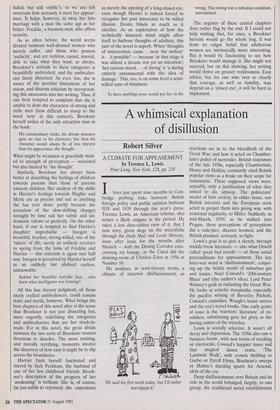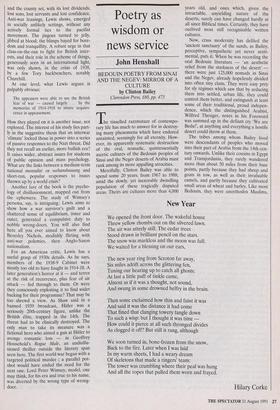A whimsical explanation of disillusion
Robert Silver
A CLIMATE FOR APPEASEMENT by Terence L. Lewis Peter Lang, New York, £28, pp. 234 Ihave just spent nine months in Cam- bridge probing links between British foreign policy and public opinion between 1938 and 1939 through the year's press. Terence Lewis, an American scholar, also senses a likely enigma in the period. He takes a less data-ridden view of it, that I now envy, given slogs on the microfiche through the Daily Mail and Leeds Mercury, issue after issue for the months after Munich — with the Danzig Corridor criss- crossing my lounge, as the Canal did the drawing-room of Clarissa Eden in 1956 at Number 10.
He analyses, in semi-literary terms, a climate of interwar disillusionment, as He said his first word today, but I'd rather not repeat it.' reactions set in to the bloodbath of the Great War, and how it acted on Chamber- lain's policy of surrender. British statesmen of the late 1930s, especially Chamberlain, Hoare and Halifax, constantly cited British popular views as a brake on their scope for manoeuvre. These supposed views were, arguably, only a justification of what they aimed to do, anyway. The politicians' model of how society, in either sense, saw British interests and the European crisis acted to propel them into giving way, with irrational regularity, to Hitler. Suddenly, in mid-March, 1939, as he walked into Prague, these perceptions of perceptions did a volte-face, disaster loomed, and the British planned, seriously, to fight.
Lewis's goal is to give a sketch, through middle-brow literature — also what Orwell called 'good bad novels' — of these social preconditions for appeasement. The key inter-war word is 'disillusionment', conjur- ing up the brittle world of suburban gin and tonics, Noel Coward's '20th-century Blues' and (the author's idea), Lord Peter Wimsey's guilt at outlasting the Great War. He looks at eclectic marginalia, especially the pacifist writing of Beverley Nichols, Coward's comedies, Waugh's lesser satires and the era's travel books. One early genre at issue is the 'warriors' literature' of ex- soldiers, substituting gore for glory as the lasting cameo of the trenches.
Lewis is socially selective. It wasn't all decay and depression. The 1930s also saw a business boom , with new forms of retailing or electricals, Coward's happier tunes and that magical dance craze, 'The Lambeth Walk', with crowds thrilling to Garbo or Erroll Flynn, Bradman's sweeps or Hulme's dazzling spurts for Arsenal, idols of the era.
Deep disillusionment over Britain and its role in the world belonged, largely, to one group, the traditional social establishment and the county set, with its lost dividends, lost sons, lost servants and lost confidence. Anti-war leanings, Lewis shows, emerged in socially unlikely settings, without any actively formal ties to the pacifist movement. The jingoes turned to jelly, jibbed at blood; the blimps bayed for bore- dom and tranquillity. A robust urge in that class-on-the-run to fight for British inter- ests, and their role in the scheme of things, generously seen in an international light, was only shown, in the crisis of 1938, by a few Tory backbenchers, notably Churchill.
At one level, what Lewis argues is palpably obvious:
The appeasers were able to use the British fear of war — caused largely . . . by the memories of 1914-1918 to insure acquies- cence in appeasement.
How they played on it is another issue, not explored. The interest of his study lies part- ly in the suggestive thesis that an interwar `climate' locked those in power into a series of passive responses to the Nazi threat. Did they not recall an earlier, more bullish era? It raises wider, abstract issues for students of public opinion and mass psychology. What are the links between a medium-term national mentalite or weltanshauung and short-run, popular responses to issues thrown up by a world crisis?
Another lure of the book is the psycho- logy of disillusionment, mapped out from the ephemera. The study of Wimsey's persona, say, is intriguing; Lewis aims to show how a war survivor's guilt and a shattered sense of equilibrium, inner and outer, generated a compulsive duty to nobble wrong-doers. You will also find here all you ever aimed to know about Beverley Nichols, modishly flirting with anti-war polemics, then Anglo-Saxon nationalism.
For an American critic, Lewis has a useful grasp of 1930s details. As he says, members of the 1938-9 Cabinet were mostly too old to have fought in 1914-18. A later generation's horror at it — and terror at the risk of recurrence, plus fear of air attack — fed through to them. Or were they consciously exploiting it to find wider backing for their programme? That may be too shrewd a view. As Shaw said in a banned 1939 broadcast, Hitler was a seriously 20th-century figure, unlike the British elite, trapped in the 14th. The threat had to be clinically destroyed. The only man to take its measure was a fictional hero who aimed a gun at Hitler to avenge romantic loss — in Geoffrey Household's Rogue Male, an undisillu- sioned thriller outside the literary span seen here. The first world war began with a targeted political murder ; a parallel pot- shot would have ended the need for the next one. Lord Peter Wimsey, model, one may think, for his era and true to his name, was diverted by the wrong type of wrong- doer.











































 Previous page
Previous page